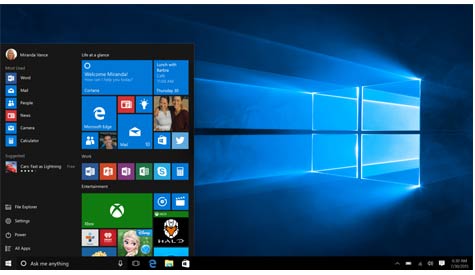The rollout of Windows 10 in the enterprise is gathering considerable – and to some insiders, surprising – support. Computerworld’s Blair Hanley Frank quotes Gartner analyst Steve Kleynhans as saying, in effect, that he was initially surprised with the speed with which enterprises planned to switch to the new operating system. He said that the surprise has faded, however, as more insiders say the rollout will come sooner rather than later.
The story outlines the likely reasons. The first is a bit counter-intuitive:
That interest is driven by a few key factors, the first of which is recent experiences migrating from Windows XP. According to Kleynhans, companies found that experience so painful that they want to get started on a new migration as quickly as possible, since Microsoft has been very clear that Windows 7’s end of life is in 2020.
The story adds that another driver of the new OS is that it enables companies to more comfortably make the move to devices with touchscreens and advanced business-class features. There was a reluctance to make those moves in a Windows 8 environment.
Forrester Research also weighed in on the corporate popularity of Windows 10. Like Gartner, it sees acceptance of the new OS. The firm found that 49 percent of organizations surveyed plan on adopting Windows 10 next year, a full 27 percent more than the answers to the same question in 2012 regarding Windows 8. Almost four in 10 – 38 percent – of workers who use a computer want Windows 10 on their next computer. Business Insider’s Matt Weinberger summed it up:
It’s weird, because big organizations are usually the last to want to adopt any new technology, let alone a whole operating system.
Microsoft, of course, understands that the success or failure of the new OS will, to a great extent, rest on how it does in the enterprise. Last week, the company announced an extension of its collaboration with the Hewlett Packard Enterprise Co. [subscription required] that launched last year. The partnership, which focuses on cloud computing and consulting, will build offerings based on Windows 10 that target HP Enterprise’s corporate customers, according to The Wall Street Journal.
The OS is being born into a new environment in which much of what happens in a computing environment doesn’t occur on the machine hosting the software. It’s all about the cloud, and how the OS manages the relationship of each machine in that decentralized landscape:
The new collaboration with HP Enterprise takes advantage of Windows as a Service, Microsoft’s term for offerings that include automated management of updates to the operating system. The as-a-service approach will help HP Enterprise’s corporate customers manage software on their computers …
This is all very good news for Microsoft, which seems to gradually be turning the corner in the post Steve Ballmer era.
Carl Weinschenk covers telecom for IT Business Edge. He writes about wireless technology, disaster recovery/business continuity, cellular services, the Internet of Things, machine-to-machine communications and other emerging technologies and platforms. He also covers net neutrality and related regulatory issues. Weinschenk has written about the phone companies, cable operators and related companies for decades and is senior editor of Broadband Technology Report. He can be reached at [email protected] and via twitter at @DailyMusicBrk.




